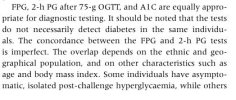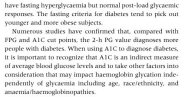I've posted previously about being labelled as prediabetes because of my blood sugar level, my most recent test in February 2025 showed it had risen to 46 mmol/mol (6.4%). I'm extremely active and fit, I don't eat UPFs, pastries, pizzas, cakes, cookies, biscuits, pasta, potatoes, candy, sweets. I'm struggling to understand the causes of my high BG levels as it not from diet, lifestyle, stress, lack of sleep or any of the other common factors. My Tryglyceride:HDL-C ratio suggests I do not have insulin resistance. My body fat % is 15, my visceral fat is <90 cm2. My LMI and ALMI are in the 98th centile. My BP is 110/70. I'm on no medication and I have no health issues. I'm 67.
I've been searching for reasons for my high BG and yesterday I listened to a podcast by Drs Ben Bikman and Ken Perry, about how HbA1c alone is not enough and can even give false positives. If I have understood correctly HbA1c measures the glycation of RBC (red blood cells), but the older RBCs are the more likely they are to be glycated. RBC age varies but is around 110-120 days. For some individuals it may be as short as 70 days, for others as long as 140. It seems that RBC age may increase as we ourselves age, so that BG levels are likely to rise over time for this as well as other reasons not related to diet, lifestyle etc i.e it's a function of getting older and normal.
The podcast also discussed a fructosamine test as either an alternative or adjunct to HbA1c as it looks at a different form of glycation. I struggled to understand this and I wonder if any forum members, moderators or admins can simplify what it tests and why it's used please.
I've been searching for reasons for my high BG and yesterday I listened to a podcast by Drs Ben Bikman and Ken Perry, about how HbA1c alone is not enough and can even give false positives. If I have understood correctly HbA1c measures the glycation of RBC (red blood cells), but the older RBCs are the more likely they are to be glycated. RBC age varies but is around 110-120 days. For some individuals it may be as short as 70 days, for others as long as 140. It seems that RBC age may increase as we ourselves age, so that BG levels are likely to rise over time for this as well as other reasons not related to diet, lifestyle etc i.e it's a function of getting older and normal.
The podcast also discussed a fructosamine test as either an alternative or adjunct to HbA1c as it looks at a different form of glycation. I struggled to understand this and I wonder if any forum members, moderators or admins can simplify what it tests and why it's used please.



